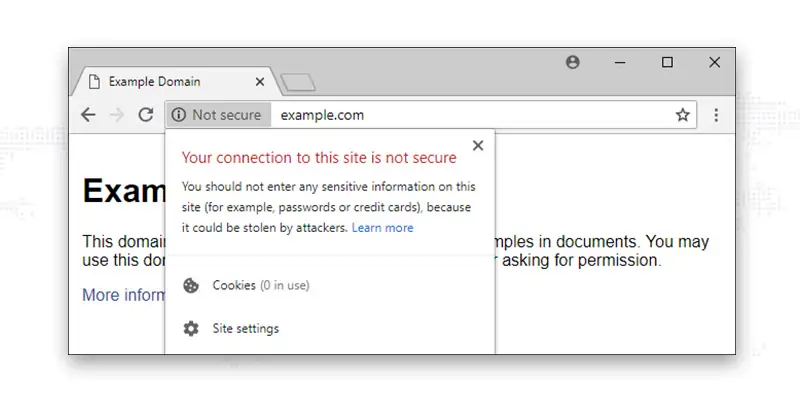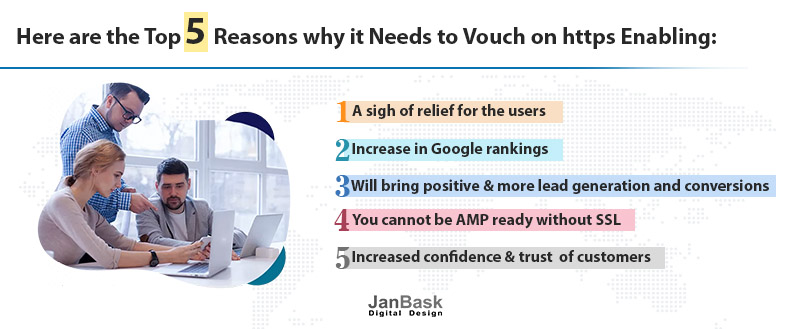
Do you know security affects the performance of your website? And if you aren’t strongly considerate about security factors, you can heavily lose market reputation, website traffic and more of all sales opportunities.
Websites that are still hosting themselves on HTTP need to immediately make a shift to HTTPS. Well, now you would think, why is shifting to HTTPS a big necessity? If we have to explain in short why HTTPS over HTTP, we would say HTTPS is very much secure and is highly preferred by Google over HTTP.
It’s been found that - “85% of website users won’t continue to make a final purchase from the website if they find such a website’s connection as unsecured. While 82% of the users won’t prefer browsing a website that seems unsecured”.
Despite knowing the benefits of HTTPS websites and Google’s warnings rollout, we found many small scale business websites operating over HTTP, thinking they are redeemed from malware or cyber threats and has this approach “why a cybercriminal would want to hack such a small website, like wouldn’t they be interested in only hacking the big scale websites?”
43% of cybercriminals target small scale business websites. So whether you are a few dollars earning-website or a multimillion earning website, the “security” and “business downtime” threats are circulated in equal measures to all.
In the following blog, we will highlight what HTTPS is, types of SSL certificates required to become HTTPS sites, and will bring some convincing facts explaining why being one of the HTTPS websites is a major gain along with steps to migrate into HTTPS.
Almost 47% of websites are still risking their security by being at HTTP.

Let’s make you understand what HTTPS is, in general first, before pulling out some convincing statements to make you realize why sites with HTTPS stamps are more recommended.
HTTPS is an acronym for “HyperText Transfer Protocol Secure”, a group of rules made to transfer the information on a web page from a “server” to “web browser”. The method helps in preventing the “man-in-the-middle” attacks when some intruders maliciously try to steal the website user’s valuable information like credit card details, contact numbers, login credentials, and other personal information.
Why is HTTP not secure? With HTTP (HyperText Transfer Protocol), carries the internet communication in a plain text, in which, any third-party can enter the communication and intentionally steal the information getting exchanged between the “server” and the “web browser”.
While HTTPS makes the communication between the server and web browser with encrypted information, there, the intruder can’t interfere with the communication and hack the information. This is the reason why HTTPS websites are considered more immune to cyber threats than HTTP ones.


Have you ever seen websites with green padlock alongside the URL in those SSL websites?
SSL certificate is a collection of data files that you need to add to your server, for generating a secure connection between your server and the web browser. When you install the SSL (secure sockets layer) certificate, a green padlock appears alongside your web URL, indicating that your website is secure and safe for users to browse. Now you know what vitality SSL certificate holds, get SSL certificates for websites if visitor’s safety is your priority.
SSL and HTTPS are interchangeable terms, SSL or SSL certificate is a set of data files you add or install on your server. While HTTPS is the final result you see when the SSL certificate is installed over the server.

HTTPS makes use of Transport Layer Security (TLS) and Security Socket Layers (SSL) keys for encrypting the information. When these two keys are transmitted between the server and web browser, the communication and the information flowing between, stay secure.
On having these keys, it gets impossible for the intruders with hacking intent to hack the personal information from the server or web browser.
If your website isn’t secure yet, here are the top reasons why it needs to vouch on HTTPS enabling:
No matter if you have an information-based website or an eCommerce website, with both websites, you are directly/indirectly retracting user’s personal information to fulfill business requirements.
Users share their personal information to your website with a belief that it will be safely utilized. And if you do not want to deteriorate that user’s faith in your business, it’s implicit for your website to harness security measures tightly.
And in the off chance, if your website falls prey of data breaches, you will have to bear the consequences like The bad image in the market
With data breaches getting massive, shifting to HTTPS will help in keeping your users’ trust intact. For users, there won’t be any hesitation in sharing their personal information, be it their credit card or login credentials.
When you will have that green padlock flashing around your URL space, users will have a great sigh of relief and won’t give second thoughts in continuing over your website. And you will have this equation:
HTTPS = No privacy breach = Satisfied users
Google’s Webmaster Trends Analyst - Gary Illyes has clearly stated that “if all search engine ranking factors are equally positive for two websites, the ranking preference will be given to a website that’s enabled with HTTPS”.
Back in somewhere 2014, Google rolled out an update stating that it will make HTTPS a pivotal factor within its search ranking algorithms.
Google made a clear declaration to all the webmasters, saying it will be encouraging and rewarding the websites who are highly acknowledging the need to become one of the HTTPS sites.
More than 40% of the websites on the first page of SERP are the sites with HTTPS enabling.
This fact is no surprise to us as Google has repeatedly said that it’s highly going to support the websites who are adopting the most secure methods. Google wants to serve the best user experience and prevent them from landing upon “malicious attempts prone websites”, which is why they carefully filter the non-secured sites and outrank them to prevent users from finding them.
If you are not a part of HTTPS sites, your website has a higher probability of getting outranked by the competitive HTTPS websites.
What SEO factors you need to keep in mind when making your website a part of SSL websites?
Google requires webmasters to keep the following things in mind before getting the SSL certificates for websites.
3. Will bring positive & more lead generation and conversions
When you host an HTTP website, your users will feel threatened to continue on your website, to fill those lead conversion forms. As they will have a constant fear of risking their private credentials to some dangerous hacker. Even if that private credential is their basic email address, they will feel hesitant to share, thinking some third-party will interfere with the communication and acquire that email address to exploit their privacy.
With HTTPS…
Website visitors will freely access and navigate the website without fear of risking their private information. When they know their information is safe, they will have an easy time filling the product or service buying forms.
The migration to HTTPS will do two good things:
You gain conversions at the snap of the fingers when you serve the secured web product to the users.
4. You cannot be AMP ready without SSL
AMP is an acronym for “Accelerated Mobile Pages”, and means the technology that’s responsible behind making the certain pages load faster with a lightning bolt sign in the searches.
When you make searches via mobile devices, you must have noticed certain results appearing with a lightning bolt sign. Well, those results are AMP-supported.
We know how AMP boosts the website ranking in the SERPs ever since Google made AMP support one of the major factors for ranking, back in 2017.
As a website, you too would want to host a website that’s AMP supported but do you know, to become an AMP-friendly website, SSL is required.
If you do not want to compromise on the ranking win and want to be labeled as an AMP-supported website, there you need to examine and adopt every requirement for getting that AMP badge, be it may be migrating to HTTPS via SSL certificate.
5. Increased confidence & trust of customers
Sites with HTTPS padlock give a boost to the confidence of visitors or potential customers. When they know, the website they are transacting or communicating with is security conscious and won’t store their personal information, they feel confident and trusted. They will navigate the website with great trust and will even convince their peers to navigate the website. This will eventually lead to positive brand building for the websites.

Hope with the above, you have clarity on why becoming one of the HTTPS sites is a need of the hour. Now, let’s guide you towards how to enable HTTPS padlock and acquire SSL certificates for websites, copy these 4 steps:
Step 1 - Purchase an SSL certificate
There are certain web hosting services providers who as an added benefit provides the SSL certificate. If you are starting as a new website, ensure your website hosting service provider does that or not. Even if it doesn’t, ensure buying the certificate just after developing the website.
You can buy the SSL certificate from popular platforms that sell the certificate for less than $10 per year. This is the general peanut size amount that you would require to splurge, whichever platform you prefer to buy from.
Steps 2 - Install the certificate on your server
ask your web host or web developer to install the SSL certificate properly over the server.
Step 3 - Check whether the installation is done successfully or not
After installing the certificate, look closely for the errors that might have crept in. If your web copy has some non-HTTPS supporting elements, there you will experience some errors.
Carefully analyze and treat the errors that occurred while migrating the website over HTTPS.
Step 4 - Notify Google about your migration to HTTPS
Once you have added an SSL certificate in your server, update Google about your such move - do this by updating your Google Analytics account settings and Google Search Console.
One you notify Google about your move, Google will start crawling and re-indexing your website in its database. Once Google will come in practice of automatically crawling your website, soon you will start reaping the SEO benefits.
Important - After migrating the website to HTTPS, you initially would see that your website’s ranking is dropping, which is nothing to worry about. Once Google will be completed re-indexing all your web content, the ranking you already had will restore.
So this was it. To keep your SEO efforts and customer’s trust growing every day, migrating your website to HTTPS is a necessary thing. With the above, we learned a lot about why HTTPS websites are more favored by search engines over the HTTP ones. Enabling HTTPS mode on your website, you get:
If you are ready to migrate to HTTPS, JanBask Digital Design can help you with that. Our solution accelerators can help you swiftly turn towards every safer and quality web updates.
By hosting your website with JanBask Digital Design, you will get - free SSL certificates, secure FTP protocols inclusive of server-side firewalls, fast CDN (content delivery network) to support websites fast load times and storing of files at the multiple and nearest locations, great development support, WordPress optimized site to support updates, security and load times, heavy server storage space to store website files.

Leave a Reply